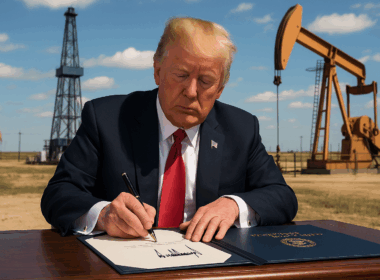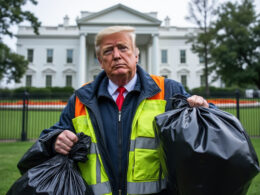Why You Should Be Very Worried About CIA and FBI Spy Gadgets
The headlines have been all over the news:
“The CIA is hacking Samsung Smart TVs” (National Post)
“WikiLeaks Publishes ‘biggest ever leak of secret CIA documents” (The Guardian)
“WikiLeaks’ CIA Hacking Claims: How Worried Should You Be?” (CNN)
That latter article concludes you really shouldn’t be that worried. Hacking TVs and smartphones to listen to people’s conversations is just part of the CIA’s job.
In other words, as so many white, affluent Americans like to say, unless you have something to hide, you really shouldn’t worry about it.
After all, the American and Canadian governments don’t kill people, or falsely imprison people, or subject their citizens to torture.
We’re the good guys.
Except … sometimes we’re not.
ELECTRONIC SURVEILLANCE IN CANADA AND THE US ALREADY COMMON

People who think they don’t have to worry about state surveillance often have short memories, little knowledge of history, or are simply naive.
Why do I say this?
Because I have been wiretapped as part of my work as a journalist.
I know people who were falsely imprisoned.
I know people who were accused of crimes they didn’t commit and who were tortured for it.
But, say some, that was all in the past. It wouldn’t happen again in the America or the Canada we know today!
I love your optimism.
That may be true for an affluent, white, middle or upper income citizen of the United States, with conservative or middle of the road political leanings.
But if you’re a political activist, a journalist, or you were born in another country, you should be much more worried about state surveillance.
The same applies if you own or work for a company with trade secrets or intellectual property.
The United States was, in fact, caught doing surveillance on foreign leaders and business people in order to win advantages in trade.
Also, if you’re a Canadian or live in some other country allied with the United States, there’s no doubt you too can end up on a surveillance list.
It’s happened to me, and it’s happened to people I know.
THE STRANGE STORY OF A ROGUE CIA ASSET IN CANADA
The first time was back in the 1980s when, as a student journalist at the York University newspaper, I quite literally stumbled over what appeared to be a CIA asset operating in Canada.
This agent, named Crawley, had infiltrated and disrupted a number of political organizations in Toronto.
Crawley had posed as a Catholic priest to infiltrate an organization at York known as the ‘Liberation Theologists’. The leftist religious group was supporting the leftist Sandinista government in their fight against against the brutal US-backed ‘Contras’ in Nicaragua.
He also posed as a rabbi in the Jewish Student Federation, and as a volunteer for the Green Party in Toronto … but he got sloppy.
The ‘American-Canadian Friendship Society’ he used to publish a propaganda rag, with “phony quotes from local politicians, was already a suspected CIA front. He also left some papers behind with phone numbers and some business cards. I called a shadowy company he supposedly worked for, told them Crawley was supposed to meet with me, and was forwarded to a different number.
It turned out to be the CIA headquarters in Langley.
That same night I got a call from the agent on my unlisted home phone number. He was not pleased that I had linked him to the CIA.
“Look out the window,” he said. I did, and saw two men in an unmarked black car. “We’re watching you. We’re listening to you all the time,” said the agent. Then he hung up, and the car drove away.
It was the first time I ran into that kind of state power, and as you can imagine, it was pretty terrifying for a kid working at the school newspaper. (I ran the story anyway, of course)
JOURNALISTS ARE TARGETS FOR STATE SURVEILLANCE
The next time I believe I was under surveillance happened while I was covering what I thought was a pretty humdrum scandal in a small BC town, but the Mayor became convinced that members of her council were committing breach of trust by giving me details of in camera meetings.
I set up a meeting with a secret source on another story, involving an RCMP officer who was secretly working with a drug gang, and was surprised when I recognized a couple of undercover cops lurking around. I got suspicious and canceled the meeting.
The next week we did our own sting, and I set up another ‘secret meet’ with a phony secret source, and sure enough, undercover cops showed up.
For the rest of my career I became obsessive about protecting my sources.
As an investigative reporter I and my colleagues assumed phones were tapped, computers were compromised, and emails were tracked.
I sometimes provided my sources with burner phones to contact me. Sources used laptops at public libraries, and communicated through agreed upon codewords to set up our meetings.
This fear of surveillance of journalists is not made up.
Just last year the provincial police in Quebec admitted they monitored the cellphones of six journalists, three of them my former colleagues at CBC Radio-Canada.
Unfortunately, it’s not just journalists who have to worry about government surveillance . The consequences for ordinary citizens can be much more serious.
FOUR ORDINARY CANADIANS TORTURED DUE TO BUNGLED INVESTIGATIONS
Most Canadians are familiar with the case of Maher Arar, a Canadian engineer who was mistakenly identified by US intelligence as an operative of Al Qaeda.
Arar was arrested by Homeland Security at JFK airport in New York and deported to Syria. He spent a year in that country’s most notorious prison, being tortured by Syrian interrogators before the Canadian government realized he was completely innocent.
Canadians are less familiar with Abdullah Amalki, Ahmad El Maati, and Muayyed Nureddin. These three men were also arrested and tortured in Syria and Egypt because the Canadian and US security forces bungled an investigation, and concluded they were terrorists.
The three were just ordinary guys living ordinary lives before a completely botched surveillance operation ruined them.
Almalki was a communications engineer. Nureddin was a geologist. El Maati was a truck driver who made deliveries in Ottawa.
Some of the ‘evidence’ against him included a map on which El Maati allegedly made suspicious marks on key government buildings. The feds were convinced El Maati was planning a terrorist attack.
It turned out El Maati was just marking the various places he had to make deliveries.
El Maati spent the next 26 months being tortured in a Syrian prison. He described to me how the interrogators would wake him up in the middle of the night, and beat the soles of his feet with clubs.
Just last month, the federal government settled a lawsuit with the three men. After 15 years.
Now, all this happened at a time when American and Canadian officials were trying to protect our countries after the terrible 9/11 attacks in New York and DC.
It’s fair to say they were still the good guys … or at least their intentions were good.
What scares me, and should scare you too, is what happens when we’re no longer the good guys.
RUSSIAN SURVEILLANCE ALL ENCOMPASSING
Consider Russia, where an Orwellian system of surveillance is used not just to keep an eye on political opponents, but also to ruin their reputations.
The World Policy Institute says bluntly that Russia’s short-lived experiment with democracy has failed: “Over the last two years, the Kremlin has transformed Russia into a surveillance state—at a level that would have made the Soviet KGB (Committe for State Security) envious,” says their report.
In Russia today, every major server, Internet Service Provider and telecom system literally runs through a network of surveillance equipment known as the System of Operative-Investigative Measures, or ‘SORM’.
SORM gives the Federal Security Service (FSB) the ability to listen to any phone call, intercept any email or text, or hack into any computer in the country.
If you’re on the internet in Russia, the government can watch everything you do.
Last year, Russian political activist Natalia Pelevina got an ugly lesson in state power when her affair with the country’s opposition leader, Mikhail Kasyanov, ended up on television.
Pelevina says the FSB recorded video of her and the Russian opposition leader having sex and talking privately about their political colleagues, and then passed it on to a Putin-friendly TV network to discredit them.
That, of course, is Russia, a country long known for state surveillance. It couldn’t really happen in a democratic country like the US or Canada … right?
Well, of course, it already has.
CAN IT HAPPEN HERE? IT ALREADY HAS.

Long before there was an internet, in the late 1940s and the early 1950s, state surveillance was used to target people with communist or ‘leftist’ political beliefs.
During those years Senator Joe McCarthy and the House Un-American Activities Committee directed the FBI to investigate suspected communists and ‘subversives’ through the use of wiretaps, surveillance and the infiltration of leftist groups.
The lives of thousands of people were ruined. Many lost their careers, some were convicted of crimes they did not commit, and not a few committed suicide.
The big difference is that J. Edgar Hoover couldn’t listen to you through your Samsung Smart TV, or read your emails, or intercept all your cellphone calls.
If we go through another period of political oppression like the Red Scare, the heavy hand of government would be a great deal heavier.
It’s true the recent WikiLeaks revelations about CIA hacking abilities won’t surprise many people.
The CIA and other security services around the world have spent a long time hacking virtually every device that connects to the internet, especially if it contains a microphone or a video camera.
The revelations of Edward Snowden, who revealed the National Security Agency can literally listen to almost any cellphone and intercept any email, made it clear the US government can track almost everything we say and do.
The question is whether we should be concerned about the government’s intentions.
GROWING CONCERN OVER TRUMP ADMINISTRATION
Increasingly, that answer is probably yes.
A year ago, with the more liberal Barack Obama in the White House, the idea of nefarious agents bugging your Smart TV might have seemed ludicrous.
Now, Donald Trump sits in the Oval Office, and many people are far more worried, including even those who run the NSA, the FBI and the CIA.
Like Putin, Trump has frequently spoken of taking action against his political opponents, and against anyone who criticizes him.
During the election campaign Trump frequently vowed he would try to have his opponent Hilary Clinton thrown in prison for using a private email server. Now he wants former President Barack Obama investigated (ironically) for allegedly bugging the Trump campaign’s phone lines.
And, while Trump may not have been involved, there is now little doubt that Russian hackers influenced the US election by accessing the Democratic National Committee’s email servers.
Trump has also waged a war of words against the media. He is pushing a plan to ‘open up our libel laws’ so he can more easily sue news outlets, thereby crushing criticism and dissent. He has threatened to retaliate against news outlets like the Washington Post with the power of government agencies.
Throwing opponents in prison? Silencing the media?
It all sounds very familiar, when you look at countries like Russia, or more recently the Philippines, where President Rodrigo Duterte has encouraged the execution-style murders of about 7,000 citizens and then threw his harshest critic into prison on trumped up drug charges.
Can the same thing happen in the United States? Would the US use their surveillance powers against citizens in allied countries like Canada?
Of course, it is very possible. State surveillance is a double-edged sword. It is undoubtedly useful and even necessary for national security … but it can also be abused by leaders who wish to create a totalitarian state.
The US is no more immune to demagogues than any other country, and the current administration is causing many people in the media, in the political opposition, and among minority groups to become increasingly afraid.
Right now the heads of the nation’s intelligence community – primarily the CIA, the NSA and the FBI – have resisted any attempts to recruit their powers in ways that would hurt American democracy.
Homeland Security, on the other hand, was quick to unlawfully arrest and detain travellers going to or through the United States after Trump passed a clearly unconstitutional ban on Muslim immigrants and visitors.
Over time, the current government can replace the heads of the Intelligence Community, and this is where the real concerns lie.
If the US does enter a new era of McCarthyism -this time aimed at Muslims, journalists and political opponents – is there really anything to stop the American government from spying on us?
Frankly, the answer is no. Unless you want to go analog or go off the grid, you can be easily spied upon. There is a very real reason why Facebook founder Mark Zuckerberg always covers the camera on his computer.
Over the next four years I expect there will be a battle over freedom and privacy in the United States beyond anything we’ve seen since the days of McCarthyism … but this time the stakes are much higher because the technology is much better.
And in the meantime, I really have to get my Roomba vacuum cleaner checked out. It seems to be following me ….












